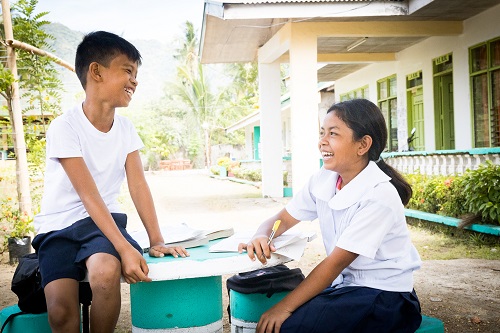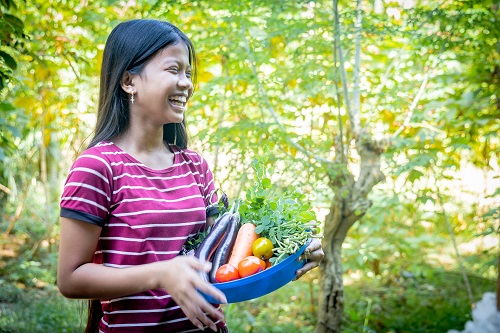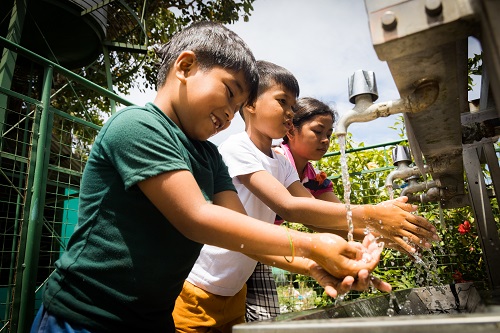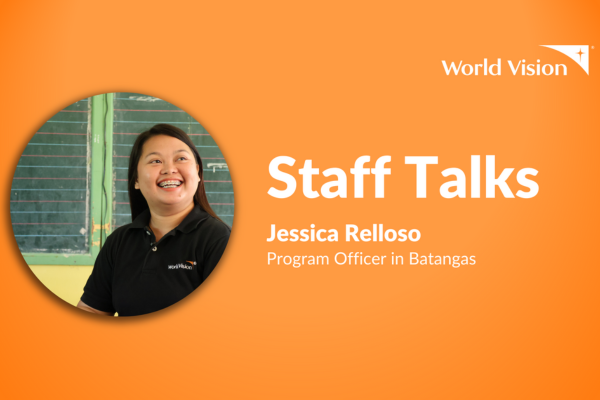Building a better school for children to learn and play

As Philippine schools prepare for face-to-face classes soon, elementary students, Kristine, 11, Grade 6, and James, 9, Grade 4, are excited about the possibility of returning to school to see their teachers and classmates again.
Walking towards their school, the only elementary in their community, both students admit that going to school is better than studying at home.
“I miss going to school because I can play with my friends,” James says, swinging a plastic envelope containing his module in his hand.
“Studying in school is much better than in our house because I can ask our teachers right away if there are things we don’t understand in our books,” Kristine adds.
Kristine and James study in a World Vision partner school in Batangas. The partnership ensures that the students have a conducive place to study and play.
“Our elder sisters are currently cleaning the school garden,” says Kristine, pointing at a group of people, chatting while picking weeds. “We used to harvest vegetables from our garden. Some vegetables were used for our feeding program.”

Prior to the Covid-19 pandemic, World Vision provided the school with vegetable seeds and taught teachers and older students how to do organic farming in support of the Department of Education’s Gulayan sa Paaralan Program (School Gardening Program). The Gulayan sa Paaralan supports a school’s feeding program to improve school attendance and the performance of students.
Several families surrounding the school also learned from World Vision’s organic farming method that a demo farm was put up near the school where both teachers, parents, and students can visit and learn. Organic products are also being sold in the said demo farm.
“Please wait here. I’ll just drink water,” James says and hurried off to a nearby water station.
“That’s from World Vision. It’s the only water here where we can drink safely,” Kristine says referring to a water system with a big blue container on top. She stood up and followed James.

The water system, a project between World Vision and Planet Water, is an additional water facility to the school. Water can be used for washing hands or drinking because it contains a water filtration solution that removes bacteria and viruses among others so children can have safe drinking water.
James and Kristine came back running. They both were catching their breath when they reached the bench they were sitting.
“I and my classmates ran around our schoolyard during recess and after class. I was the fastest runner among my classmates,” James boasts.
“No, you’re not,” Kristine retorts, then laughs.
The sun’s heat was scorching. Some parents who have been cleaning the garden started going home while others were still queuing in front of newly built classrooms, waiting for the teachers to receive the student modules.
“That’s your Ate, James,” Kristine says. [Ate is a Filipino word for older sister]
“She’s giving my workbooks to my teacher for checking,” James replies. “Teacher is late today.”
The classrooms, which replaced the dilapidated ones, were constructed by World Vision in partnership with LBC Foundation and Philam Foundation. The rooms have ceiling fans, blackboards, plastic armchairs, a teacher’s table, separate comfort rooms for boys girls, and an indoor hand washing basin. James and Kristine say that Grade 6 students currently use the new classrooms.
At the height of the Covid-19 pandemic when schools struggled to provide workbooks for their students, World Vision donated a printer and papers to help with the volume of worksheets that needed printing for students who studied at home. With the additional printer, producing student modules on weekly basis became easier for the teachers.
When asked what they most like doing in their school, James and Kristine say to play local games with their classmates during recess or after class.








